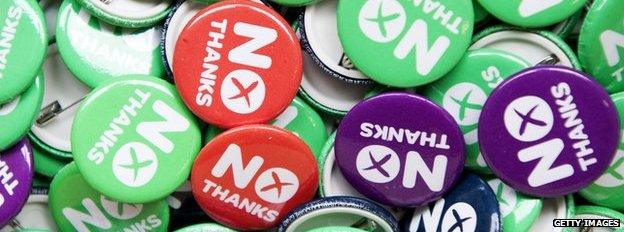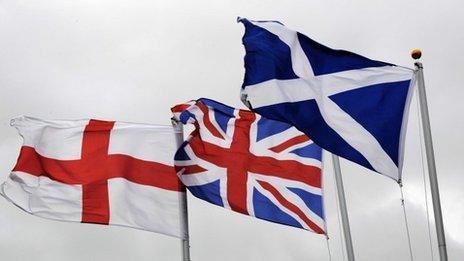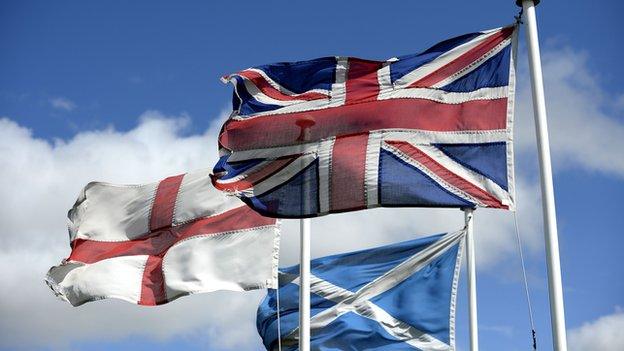English MPs would get tax veto under Conservative plans
- Published
William Hague: "It would be an evolution, an important one, in the Westminster Parliament"
MPs for Scottish seats would be stripped of the power to "impose" income tax rate changes on England under Conservative plans.
MPs for English seats would have a veto on tax, and issues like schools and health, which only affect England.
The plan falls short of the English Parliament demanded by some Tory MPs.
But Commons leader William Hague said it was a "fair solution". Labour is calling for a cross-party investigation into the matter.
Scotland is on course to be given the power to set its own income tax rates and bands - and Air Passenger Duty rates - under proposals drawn up by the The Smith Commission, external in the wake of September's independence referendum.
'Stitch-up'
Prime Minister David Cameron promised a new settlement for England at the same time.
Critics say it is unfair that Scottish MPs should help decide how things such as schools and the health service are run in England, when English MPs have no such say over how they are run in Scotland.
But attempts at cross-party talks to resolve the so-called "West Lothian Question" were boycotted by Labour - which could struggle to get key legislation through the Commons if it won the election without its Scottish MPs - as a "stitch up".

How Hague's plan would work
Before a Bill or parts of a Bill affecting only England, or England and Wales, is put to its final Commons vote, English and in some cases Welsh MPs would meet separately to consider it
The Bill could not proceed without the backing of a majority of this English Grand Committee
In addition, only MPs for English constituencies (and Welsh seats where relevant) would be allowed to take part in the committee stage, where the fine details are thrashed out and amendments proposed
But MPs from all parts of the UK would be entitled to take part in the final Commons vote passing the Bill into law

Mr Hague's plan would give an effective veto to MPs for English seats - and Wales on some policies - for matters decided in the Scottish Parliament, but would still require a majority of all UK MPs to pass legislation.
He said it was the least radical of three options to resolve demands for "English votes for English laws" but would bring "fairness and accountability to England without breaking up the unity and integrity of the UK Parliament".
He told BBC Breakfast: "MPs from all parts of the UK would continue to debate, as they do now, anything they want. It is just that they would only be able to pass measures relating only to England with the agreement of the English MPs."

Analysis

James Landale, BBC deputy political editor
English MPs were never going to be given total control over English law. That would have created a de facto English Parliament that many MPs believe would have left the United Kingdom unworkable.
David Cameron never had this in mind when he stood outside Downing Street last September and promised to listen to the voices of England.
While some constitutional purists on the Tory benches are feeling sore, others are content. They now have something to say on the doorstep about the so-called English issue.

Mr Hague said the Commons Speaker would probably have the job of deciding which measures should be treated as England only.
He said the proposals were unlikely to become law before May's general election but they would be in the Conservative manifesto and he was keen for MPs to debate them before the election.
'Leverage'
But some Conservative MPs say the plan will still give MPs for Scottish constituencies too much influence.
Former Cabinet Minister John Redwood told The Daily Telegraph, external: "It gives them leverage. If you had a lot of Nationalist MPs, for example, who wanted something for Scotland then presumably they would all gang up and try to block an English proposal until we cave in on what they wanted. It would be perfectly legitimate political tactics."
He said Tory MPs would not back Mr Hague's proposals.
In December Labour said an English, or English and Welsh, committee stage would give those MPs "a key role" in considering the legislation in question, while MPs as a whole would have the final say.
Labour said this and other ideas should be considered by a constitutional convention after May's general election.
The Liberal Democrats favour a grand committee of English MPs, with the right to veto legislation applying only to England, with its members based on the share of the vote.
But Lib Dem Deputy Commons Leader Tom Brake said it would be a "major mistake" to "rush through" changes without a constitutional convention.
UKIP Deputy Leader Paul Nuttall said: "Cameron has spoken of English votes for English laws but these proposals will fail to deliver anything but chaos."
Stewart Hosie, deputy leader of the SNP, said Hague's plan was "confused and a bit shambolic" and the UK government could not exclude Scottish MPs from debate unless full tax and spending powers were devolved to Holyrood.
Elfyn Llwyd, Plaid Cymru's leader at Westminster, said English votes must "go hand in hand with home rule all round and the Barnett formula must be replaced in order to address the chronic underfunding of Wales".
- Published3 February 2015
- Published3 February 2015

- Published12 December 2014
